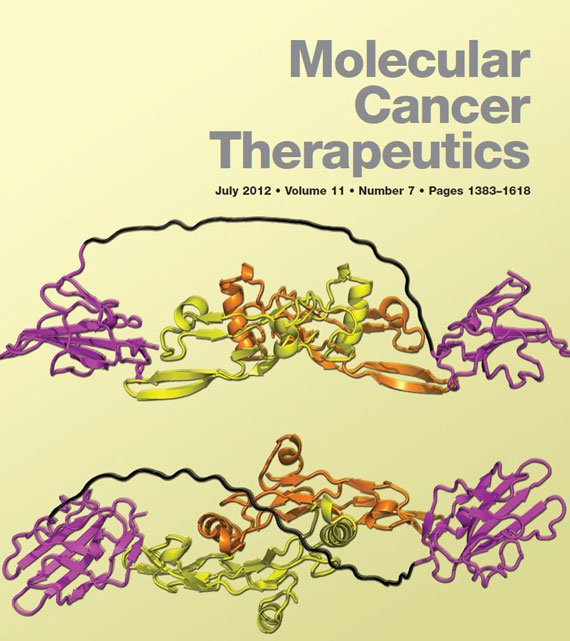From new protections against food-borne illness to enabling more effective treatment for HIV, the Government of Canada's investment in the Genomics Research and Development Initiative (GRDI) continues to deliver for the health of Canadians—including the development of a number of promising new treatments for cancer led by researchers at the National Research Council of Canada (NRC).
Investment complete, but returns continue
Although not currently funded through the initiative, GRDI investment over a number of years beginning in 1999 enabled the NRC's Human Health Therapeutics Research Centre to develop the capacity to apply new genomic, proteomic and bioinformatic approaches in seeking out new ways to attack cancer cells at the molecular level—and those GRDI investments continue to bear fruit.
Most recently, the NRC collaborated with Montreal-based Forbius (Formation Biologics) to advance development of a new drug based on discovery work at the NRC. The new drug, named AVID200, works against transforming growth factor beta (TGF beta)—a protein secreted by cancer tumours, which helps cancer grow and spread by, in effect, "hiding" the tumour from the body's immune system.
Partnership accelerates development

An illustration of the molecular structure of AVID200 made the cover of Molecular Cancer Therapeutics, a journal published by the American Association for Cancer Research.
Following the NRC's initial discovery of the AVID200 prototype, the NRC and Forbius entered a co-development agreement in 2016 to select a lead candidate and accelerate clinical development of the drug. That agreement marked the beginning of what Forbius Chief Scientific Officer Dr. Maureen O'Connor-McCourt calls "a close collaboration between the company and the NRC," leading to the start of Phase 1 clinical trials of AVID200 in 2019.
At the NRC's Human Health Therapeutics Research Centre, project manager Karine Khougaz says the partnership moved the drug development forward at impressive speed: "To go from selecting a lead candidate for a new drug to testing in humans in just a little over 2 years is remarkably fast," says Dr. Khougaz.
Dr. Martin Plante, NRC Research Officer and Project Leader, agrees: "It's a real accomplishment, and it says a lot about the expertise and dedication of the people on the multiple teams involved in the project here at the NRC."
A new approach
Dr. O'Connor-McCourt says AVID200, which acts as a "TGF trap," differs from other drugs designed to interfere with the function of TGF beta in that it specifically targets the 2 oncogenic (cancer-causing) isoforms of TGF beta (TGF beta-1 and TGF beta-3) while not interfering with TGF-beta 2, the isoform that supports normal cardiac functions.
In addition to solid-tumour cancers, Dr. O'Connor-McCourt says AVID200 shows promise as a treatment for myelofibrosis—an uncommon form of bone cancer—as well as scleroderma, a rare autoimmune disease. Clinical trials to assess its safety and effectiveness in treating those diseases are also underway.
Building on success
AVID200 is only one of a number of successes that can be linked directly to GRDI investment. Prior to this recent collaboration, for example, Forbius and the NRC partnered in the development of AVID100, another NRC discovery that shows significant potential for the treatment of highly aggressive cancers, such as lung, head and neck, and triple negative breast cancers. AVID100 is currently in Phase 2 clinical trials in Canada and the US.
As well, in the early 2000s, NRC researchers identified an antibody that targets non-small cell lung cancer—the most common form of the disease. While the antibody cannot destroy cancer cells itself, it can be used to make treatment more effective by carrying an anti-cancer drug directly to the tumor. Licensed to Helix BioPharma of Richmond Hill, Ontario, a new drug based on the NRC discovery is now in clinical trials to test its effectiveness in the treatment of non-small cell lung cancer as well as advanced pancreatic cancer.
A second Canadian company, Montréal-based Alethia Biotherapeutics, is preparing for Phase 2 clinical trials of another potential cancer treatment based on a discovery at NRC—in this case, a family of antibodies that can block the function of Clusterin, a protein that helps cancer metastasize (spread to other parts of the body).Footnote 1
A lasting legacy
While GRDI funding for the NRC cancer project ended in 2012, Dr. Vincent Dodelet—Program Manager at the Human Health Therapeutics Research Centre —says that, thanks to the genomics research capacity enabled by the GRDI, Canadians will benefit from those investments for many years to come.